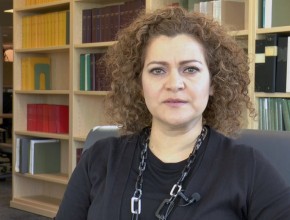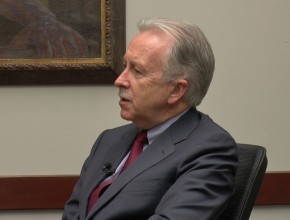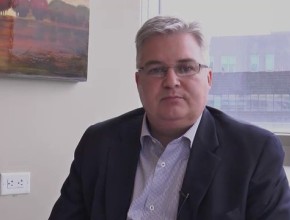References
Anthenelli RM, Benowitz NL, West R, et al. Neuropsychiatric safety and efficacy of varenicline, bupropion, and nicotine patch in smokers with and without psychiatric disorders (EAGLES): a double-blind, randomised, placebo-controlled clinical trial. Lancet. 2016 Jun 18;387(10037):2507-20. doi: 10.1016/S0140-6736(16)30272-0. PubMed PMID: 27116918.Roman Jaeschke: Good afternoon. Welcome to another edition of McMaster Perspective. Today we will concentrate on smoking cessation. I will ask our guest to introduce himself.
Francois Caron: Hello, my name is Doctor Francois Caron. I am a research fellow here, at McMaster University, with a specific interest in vascular medicine and smoking cessation. I come from Montreal.
RJ: There is a new paper which seems to provide some completely new information about smoking cessation. But maybe we will start with something different. When you are approached by or when you are approaching a smoking patient, what are your principles of interaction?
FC: Usually the first step with any patient, smoker or nonsmoker, that comes into the hospital would be to ask whether they are actively or passively smoking and to try to quantify the amount of cigarettes they are smoking. Then we try to assess where they are in their smoking cessation process. Some people have described that as the 5A process, so ask, assess, and then we try to address them with different smoking cessation therapies, either nonpharmacological or pharmacological. Then we schedule an appointment to try to see if it worked, if the smoking cessation has worked after 3 or 6 months.
RJ: Francois, when you are saying 5A’s, what does it stand for?
FC: The first A is “ask”: we need to ask any patient about consumption of tobacco, advise the patient that smoking is bad for their health and give them some relevant examples, and assess the motivation of the patient to stop smoking. Then we counsel them, [assist] them with a nonpharmacological and pharmacological therapy, and then we arrange for a follow-up at 3 months or 6 months to make sure that they have stopped.
RJ: Maybe we can jump to this assist. How can we assist the patients in a pharmacological way? Because that is the topic today.
FC: The 3 evidenced-based pharmacological therapies that we have in our armamentarium are nicotine replacement therapy (NRT), which means either the slow-release, or the patches, or the quicker release: inhalers, lozenges, or gums. Usually we use them in combination, so the patch plus the inhaler, or the gum, or the lozenge.
RJ: So they are on patch and when they feel a specific urge, they could take the lozenge or puff – is that how it works?
FC: Yes, smokers usually do that with their cigarettes: they titrate their nicotine needs, so they can do the same with NRT. And then we have pills: bupropion and varenicline, those are the two options for pharmacological therapy.
RJ: What have we known so far, before this paper was published, about their relative efficacy?
FC: We have a fair amount of evidence with randomized controlled trials with regard to those 3 therapies that show they are superior to placebo in smoking cessation efficacy at 3 months or 6 months. We have fewer evidence that compares one against the other but for now, the last meta-analysis told us there was a signal that varenicline might be superior to bupropion with regard to smoking cessation and at least equivalent to combination NRT.
RJ: The current paper: what does it add?
FC: This is actually the largest randomized controlled trial that compares head to head those 3 therapies versus placebo. What it does add is that first, it confirms what we knew from the last meta-analysis, that varenicline may be superior [in comparison to placebo] with regard to smoking cessation and we have a fair amount of evidence that varenicline is also superior to NRT and to bupropion.
RJ: NRT and bupropion.
FC: Yes.
RJ: When we are saying it is more efficacious, could you give our listeners an idea [what to do] when they are dealing with people who express motivation to quit smoking and who believe that they are able to [quit] smoking, which I think are prerequisites to smoking cessation, and then they get those interventions: placebo versus NRT versus bupropion versus varenicline. What are the chances? What should our practitioner and patient expect? What is the probability of success, roughly?
FC: It is a good approach to try to assess that with a patient. What we can do is assess their nicotine dependence. There are recognized indexes for that, but the questions that we would ask a patient would be: “Do you smoke a cigarette first thing in the morning? If so, how long after you are awake do you smoke your first cigarette?” The amount of cigarettes smoked would give us a good idea also. “Which cigarette would you first be willing to stop?” Usually the most heavy or most dependent smokers are not willing to stop that first cigarette in the morning because it gives them their nicotine rush. We can ask them if they find it hard to stop smoking in restaurants, airplanes, those kind of places.
RJ: These will be all indications that it is difficult to [quit] smoking. So what can we tell them? They say: “Doctor, I know I want to quit.” You are giving him or her some medication. What are their chances of actually stopping? What on average happens? Everybody stops? Nobody stops?
FC: Usually it takes a person 2 or 3 times, 2 or 3 trials to be able to stop smoking when they have help. What we see from previous studies and from this study is that approximately 25% of patients stop after 6 months with varenicline. With the other therapies, NRT or bupropion, it is around 20%, and with placebo it is more around 10% at 6 months.
RJ: So they do not stop at 6 months, they stop during that 6-month period and they do not smoke for 6 months?
FC: Exactly.
RJ: Did the study add something to your knowledge until now?
FC: I think it adds strength to what we knew. The other thing is that it takes down the old myth that varenicline and bupropion have a risk of neuropsychiatric side effects. It was an old thing that was raised by early postmarketing studies and was dismissed by further studies. Now we have a large-scale study that shows us in a randomized and well-conducted trial that there is no sign of increased neuropsychiatric effects, at least in the nonpsychiatric population.
RJ: This study had two populations and we will talk to your colleague about the psychiatric part, but if I hear correctly, we are pretty much confident that among people without underlying psychiatric problems those treatments do not cause new issues any more frequently than placebo does.
FC: Right.
RJ: That is a very useful information then.
 English
English
 Español
Español
 українська
українська




